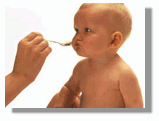 Preparing homemade baby food, rather than stocking up on jars from the grocery store, can be a satisfying experience if you have the time. Keep these tips in mind to make sure your homemade baby foods are as wholesome as can be:
Preparing homemade baby food, rather than stocking up on jars from the grocery store, can be a satisfying experience if you have the time. Keep these tips in mind to make sure your homemade baby foods are as wholesome as can be:
- Choose healthy foods. Fresh fruits and vegetables, grains, and meats (after 9 months) all should be part your baby’s daily diet.
- Thoroughly rinse fresh fruits and vegetables. Run cool water over produce before preparation. Don’t use soap.
- Boil or steam produce. Remove any peel, seeds, or stems before cooking, then cook fruits (such as sliced apples and plums) and vegetables (such as sweet potatoes and peas) until they’re soft enough to mash. When boiling, use the smallest amount of water possible to retain vitamins.
- Mash the food. Use a fork, food processor, or blender to puree or mash foods to the proper consistency for your baby’s age. For example, for an 8-month-old baby, the food should be the consistency of cottage cheese.
- Be creative with your mixtures. Babies who don’t like a particular food may love it when it’s mixed with a familiar favorite.
- Don’t add sugar or salt. If you’re using canned foods in your baby-food mixtures (such as canned green beans and canned fruits), watch the levels of salt and sugar. If they’re available, use no-salt-added products and water-packed fruits. Also, avoid strong seasonings and honey.
- Try variety of produce. Introduce your baby to new tastes and textures. Remember a lifetime of healthy eating habits is established very early on.

Cook a little extra
When you cook for your baby, cook some extra food to freeze
-
For just right portions, spoon the prepared food into an ice-cube tray. Once the food is frozen, pop out the cubes and place them in a freezer storage container or bag.
-
Defrost individual food cubes in your refrigerator, a heated baby dish, or microwave oven (taking care to stir heated food well to avoid hot spots). Touch-test the food’s temperature before feeding your baby.
Forbidden foods for baby Be sure to avoid the following foods during your baby’s first year: Sugary foods: Avoid starting your baby on sweetened foods. If you avoid foods like cookies, chocolate, and other sugary sweets, your child will be less likely to demand them in the future. Salty foods: Your baby isn’t born with a preference for salty foods, so don’t season his foods with table salt. Also hold off on feeding salty pretzels, snacks, and French fries. Your child will discover these foods on his own soon enough. Eggs: There’s a whole lot of nutrition packed into a little egg. But wait until your baby is at least a year old before scrambling one up for him. If you feed eggs any sooner, there may be a risk of an allergic reaction.
Cow’s milk and goat’s milk: Even though your baby is growing quickly, cow’s milk and goat’s milk aren’t recommended for him. That’s because they don’t provide the right proportion of nutrients for young babies; don’t even use them to mix up your baby’s cereal. In fact, the American Academy of Pediatrics recommends parents feed their babies only breast milk or iron-fortified formula for the first 12 months, waiting until after the first birthday to introduce cow’s milk.
After your baby is 1 year old, you can introduce him slowly to whole cow’s milk. But don’t be tempted to serve reduced-fat or fat-free milk to children under 2 years of age. Little ones need the extra fat in whole milk to provide energy for their growing bodies.
Honey: It is recommend not to give babies honey until they are a year old. Tasty as it is, honey can contain spores that cause botulism poisoning in infants. Although rare, botulism poisoning can have serious effects on babies.
Too much juices: An infant who is less than a year old shouldn’t drink more than 6 fluid ounces of juice per day. Too much juice can displace the needed protein, fat, and vitamins in breast milk or formula. Give baby diluted juice in a sipping cup rather than a bottle. Using a cup can help prevent cavities in the growing teeth.
Chewable foods: Some foods can cause choking in infants under a year old. Avoid giving your baby:
-
Raw vegetables, such as carrot and celery sticks
-
Grapes, cherries, and berries
-
Raisins
-
Hot-dog or other meat chunks
-
Any nuts, for example peanuts, almonds, and cashews
-
Popcorn
-
Hard candy, even suckers
These foods need to be chewed; if they aren’t, they could be swallowed whole and lodge in baby’s throat.